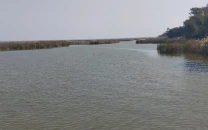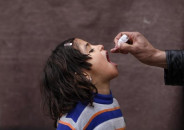Heatwaves imminent if tree cover not increased, warns IPCC report
Health and lives of millions in the coastal city will be affected due to the rising temperature, warns latest study

Health and lives of millions in the coastal city will be affected due to the rising temperature, warns latest study.
PHOTO: FILE
According to the IPCC's report, global warming of 1.5ºC-2°C is going to worsen the situation in the city where conditions comparable to the deadly 2015 heatwave are expected, along with unavoidable poverty and health risks that come with global warming.
This is the conclusion of the most comprehensive assessment of the science of climate change to date highlighted in the IPCC Special Report on 1.5°C which was discussed at a meeting of governments in Incheon, the Republic of Korea. IPCC is a body set up to provide a clear scientific view for governments on the causes, impacts and solutions to rising temperatures.
Temperature to remain moderate till June 9 in Karachi
The world has already passed a degree of warming as carbon emissions have risen continuously since the 1850s. The IPCC 1.5ºC report now confirms that the current degree of global warming has already exacerbated human health factors, such as extreme weather events, heatwaves, food security and sustainable development, and will worsen with rising temperatures.
Meanwhile, World Health Organisation Senior Scientist Diarmid Campbell-Lendrum said, "Threat to human health is increasing as nations fail to prepare. The report makes clear that the lower the warming, the safer for health. As we pass 1.5ºC-2°C, or even higher, the risks to health will multiply."
According to co-author of the 1.5ºC Health Report, Arthur Wyns from Climate Tracker, "It is now the scientific consensus that global warming affects human health, causes the loss of millions of lives and is a poverty multiplier."
Forecast predicts temperatures to rise over the weekend in Karachi
Although risks to human health and food production systems will be lower at 1.5°C than at 2°C of warming, warming of 1.5°C is not considered 'safe' for most nations and communities, the IPCC report finds.
According to the world's leading climate scientists, because of 1.5°C of warming, twice as many megacities will become heat stressed and will expose an additional 350 million people to deadly heat stress by 2050.
"The impacts of 1.5°C would disproportionately affect disadvantaged and vulnerable populations through food insecurity, higher food prices, income losses, lost livelihood opportunities, adverse health impacts and population displacements," the report concludes.
Professor Dr Zafar Iqbal Shams of the Institute of Environmental Studies at the University of Karachi believes that the increase in heatwaves in Karachi can be attributed to the urban heat island effect.
According to Dr Zafar, urban heat islands are established in urban centres due to extensive use of concrete structures in the development of the city due to which the temperatures significantly rise as compared to the surrounding rural areas.
Dr Zafar suggests that the only solution to reduce and mitigate heatwaves is to increase tree cover in the city that would overcome the risk of heat strokes, which claimed the most lives in the deadly 2015 heatwave.
"Authorities must implement laws to protect trees from getting cut down in the name of development. The only long-term solution to mitigate the worst effects of climate change is to expand our urban tree cover and initiate eco-friendly practices such as green roofs on terraces and high-reflectivity coatings for roads can be used reduce urban heat island effect," said Dr Zafar.
Residents of Karachi are already experiencing hot weather with the mercury having touched 40°C during the past few days. Pakistan Meteorological Department (PMD) states that mercury is likely to reach 33-40°C as the heatwave continues to prevail in the metropolis for the next two days.
Published in The Express Tribune, October 8th, 2018.



















COMMENTS
Comments are moderated and generally will be posted if they are on-topic and not abusive.
For more information, please see our Comments FAQ